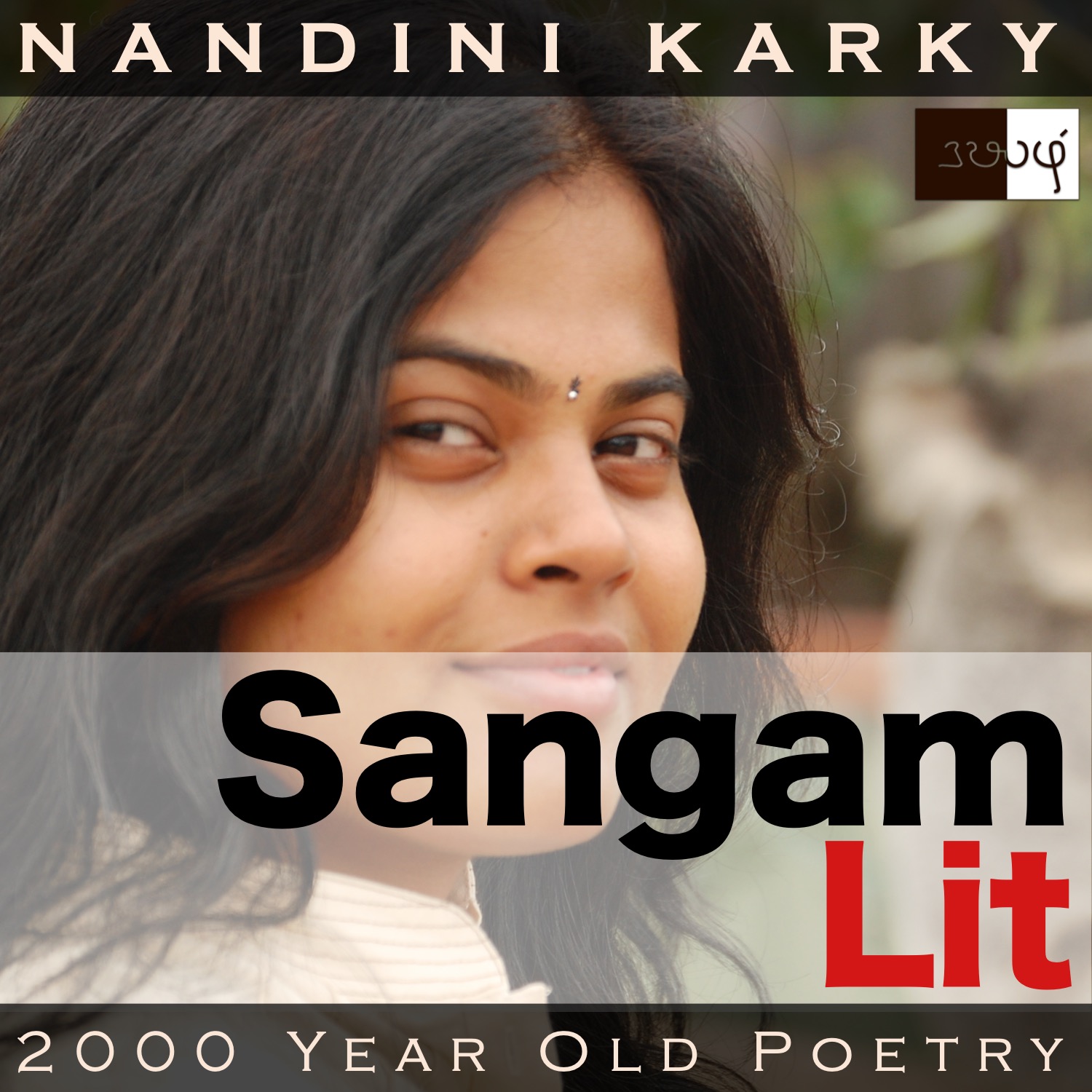Podcast: Play in new window | Download
Subscribe: Apple Podcasts | Spotify | Amazon Music | Android | iHeartRadio | TuneIn | RSS | More

In this episode, we continue our exploration of Tamil Sangam Literary work, Natrinai and traverse through Poem 9, written by Perunkadunko. Perunkadunko was a Chera King who has lent his poetic expertise to many Sangam poems, set in the ‘Paalai’ or the desert, dryland region. This poem is in the words of a man to his lady, as they look together at the path ahead.
அழிவிலர் முயலும் ஆர்வ மாக்கள்
வழிபடு தெய்வம் கண் கண்டாஅங்கு,
அலமரல் வருத்தம் தீர, யாழ நின்
நல மென் பணைத் தோள் எய்தினம்; ஆகலின்,
பொரிப் பூம் புன்கின் அழற் தகை ஒண் முறி
சுணங்கு அணி வன முலை அணங்கு கொளத் திமிரி,
நிழல் காண்தோறும் நெடிய வைகி,
மணல் காண்தோறும் வண்டல் தைஇ,
வருந்தாது ஏகுமதி-வால் எயிற்றோயே!
மா நனை கொழுதி மகிழ் குயில் ஆலும்
நறுந் தண் பொழில, கானம்;
குறும் பல் ஊர, யாம் செல்லும் ஆறே.
The first thing that called out to me, was the line வழிபடு தெய்வம் கண் கண்டாஅங்கு, which talks about people seeing God before their eyes. I was admiring the rhythm and perfect structure in the lines ‘நிழல் காண்தோறும் … வைகி’ and ‘மணல் காண்தோறும்… தைஇ’. Then there was something about ‘வருந்தாது‘ in ‘not worrying’ and references to Kuyil or the cuckoo as well as mango trees, a fragrant forest and my senses perked up. All that I saw within the fog of my limited understanding was pushing me to see more.
Dispelling this fog by delving into explanatory texts and translations, I understood the depth of this verse. This poem is in the words of a man, who has eloped with his lady love, speaking to her from a feeling of bliss. He says, ‘Imagine the wonder in the eyes of those eager people who do things perfectly, blamelessly when they see right before their eyes, their favourite god. It’s the same feeling I have, as all my misery and sadness fades, and I touch your wide shoulders. As we journey on, you may adorn your bosom with the puffed white flowers of the Pungai, the Indian beech tree, making divinity reside right there. Whenever we see shade, you may rest as long as you want; When we come by a shore of sand, you may play and build sand houses there; Walk with me, without a worry, my lady with a dazzling smile. Cool and fragrant forests, where cuckoos after a satisfied feast on luscious mangoes, sing, and many tiny, quaint villages rise along the path we will walk.’
Delving a little deeper, it’s fascinating the way the writer of this poem equates God and love. To the pious one, the doer of rightful deeds, seeing God before his eyes, is the boon he yearns for. To me, holding your shoulders in my grasp, is akin to that boon, the narrator says. A beautiful by-note in this poem is that getting the thing you yearn for and pray for, is what God truly is. As I read through the Sangam poems, I find myself getting well acquainted with the flora and fauna of the ancient world. For instance, bringing before my eyes, the Pungai or the Indian beechwood tree with its ‘puffed-rice’ like white flowers. Today’s equivalent expression could be ‘popcorn’ shaped white flowers. Incidentally, the Latin name for the tree is ‘Pongamia pinnata’, no doubt arising from the ‘Pungam’ in ancient Tamil literature. And then there’s the sight and sound of a satisfied ‘kuyil’ or the ‘Indian cuckoo’ bird, after it has pecked away at a mango fruit, hanging in a cool and fragrant forest. What an idyllic picture the man paints to his lady, who I suspect may be home-sick, thinking about the family she has left behind. And so I imagine, that the man gently holds the chin of the lady that’s turned backwards at the home she has left behind and makes it look forward at the future with him. A walk together on shaded paths with plenty of rest and play by the shore, building sand houses and dolls, as they journey on through many a tiny village. Herein lies an understanding of what makes a human heart happy. It’s not just work or love even, but rest and plentiful play, with a path that cools one’s eyes and mind.
The future seems to be beckoning. Will it be all that this man promises? The lady knows not but, with faith and determination, perhaps it will turn out so!




The narration is more beautiful than the poetry !!
Thank you for appreciating the narration. The narration is perhaps more accessible. True credit only to the exquisite poetry.